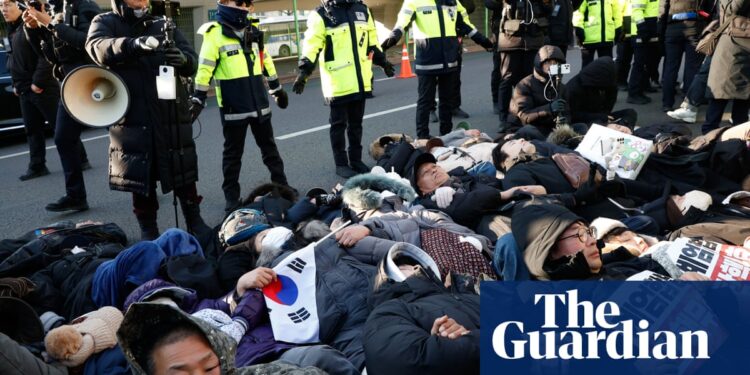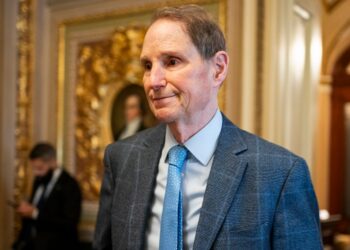South Korea’s political crisis took a dramatic turn on Friday when investigators attempting to arrest the impeached president, Yoon Suk Yeol, were involved in a tense standoff with his security forces.
The confrontation unfolded on a freezing winter’s day in Seoul, as an estimated 1,200 Yoon supporters gathered outside his official residence while police and other officials inside attempted to execute an arrest warrant – the first for a sitting South Korean president.
Local media reports said officials from the Corruption Investigation Office – which is leading a joint team of police and prosecutors – entered the compound to find themselves blocked by troops under the control of the presidential security service.
The Yonhap news agency said the team comprised 30 people from the anti-corruption office and 120 police, 70 of whom were initially waiting outside the residence compound.
Having managed to find a way past the troops, officials were confronted by other security service staff, raising doubts over whether Yoon, who was impeached in mid-December over his short-lived declaration of martial law, would be arrested on Friday.
The warrant was issued on Tuesday after Yoon again ignored a court order to submit himself for questioning over allegations that his martial law edict had amounted to an insurrection.
More than three hours after anti-corruption officials had entered the compound, it was still far from clear how the gravest political crisis South Korea has faced in decades would play out.
Investigators released a statement saying they had “started executing” the arrest warrant, but Yoon’s lawyers later said they would take immediate legal action to block it, describing it as “illegal and invalid”.
The head of Yoon’s security service, Park Chong-jun, said authorities were not permitted to search the residence, according to Yonhap.
If he is detained, Yoon, who was impeached by parliament last month, would become the first sitting president to be arrested. The anti-corruption agency would then have 48 hours to investigate him and either request a warrant for his formal arrest or release him. He would be held at the Seoul Detention Center, Yonhap added.
Yoon’s defence minister, police chief and several top military commanders have already been arrested over their roles in the martial law declaration.
While the country’s constitutional court decides whether to uphold the impeachment vote – a move that would trigger an election for a new president – Yoon is facing allegations of insurrection over his martial law edict.
He declared martial law on 3 December in an attempt to root out what he described as “anti-state, pro-North Korean” forces – a reference to opposition MPs in the national assembly. He did not provide any evidence for those claims, however.
He was forced to lift the order six hours later after lawmakers forced their way past troops into the parliament building to vote it down.
The criminal allegations against Yoon, an ultra conservative whose two and a half years in office have been marred by scandal and policy gridlock, are serious.
Insurrection is one of the few crimes from which South Korean presidents do not have immunity, and comes with penalties that can include life imprisonment or even the death penalty.
Fears that protesters would physically block the investigators were not realised, but the raid is taking place amid a huge security presence. The broadcaster YTN reported that 2,800 police had been mobilised in the area, along with 135 police buses that have been positioned to create a barrier.
One pro-Yoon protestor was heard saying to fellow demonstrators that they had to block the investigators “with our lives”. Others chanted: “President Yoon Suk Yeol will be protected by the people,” and called for the head of the corruption office to be arrested.
Pyeong In-su, 74, said the police had to be stopped by “patriotic citizens” – a term Yoon has used to describe people standing guard near his residence.
Holding a US-South Korea flag with the words “Let’s go together” written on it in English and Korean, Pyeong said he hoped Donald Trump would come to Yoon’s aid after he becomes president later this month.
“I hope after Trump’s inauguration he can use his influence to help our country get back on the right track,” he said.
Yoon, who has been holed up inside his residence since his impeachment, had previously told supporters in a letter he would “fight until the end”.
“I am watching on YouTube live all the hard work you are doing,” he wrote late on Wednesday.
“I will fight until the end to protect this country together with you,” he said in the letter, a photo capture of which was sent to the media by Seok Dong-hyeon, a lawyer advising Yoon.
Yoon has refused to back down from his uncorroborated claims that some members of the national assembly were pro-North Koreans determined to bring down the South Korean state, describing his martial law declaration as a legitimate “act of governance”. He has also aired unsupported allegations of election tampering.
A second constitutional court hearing in the impeachment case, which is separate from the criminal investigation, was scheduled for later on Friday.







